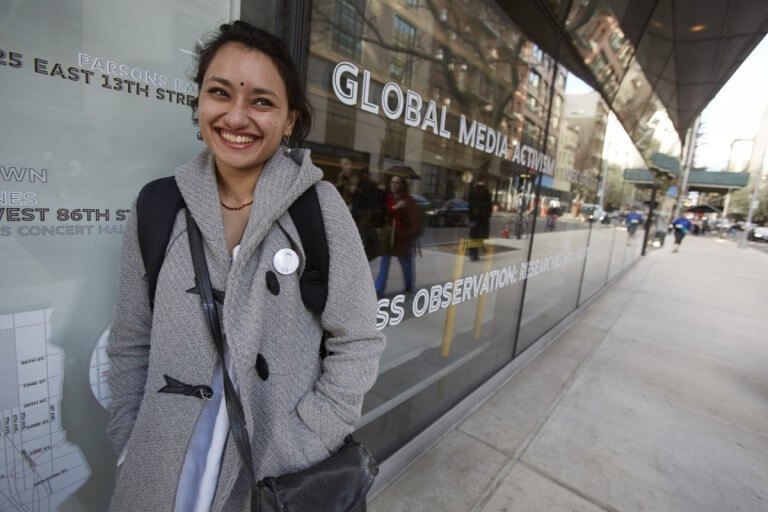
As the world becomes increasingly polarized by political ideologies and leaders recommit to old ways of thinking, it’s more important now than ever that we push intellectual thought and ask big questions about human society.
At The New School, faculty, students and alumni from The New School for Social Research (NSSR) constantly rethink and redefine research and pedagogy in the social sciences, history and philosophy. Located in the heart of New York City, this graduate institution is home to more than 75 full-time faculty members, plus nine departments and committees offering master’s and doctoral degrees to 800 graduate students from 70 countries.
“Our faculty is united by a sense of the importance of boldly questioning conventional thinking and expanding the boundaries of social thought—from James Miller’s writings on the relation between philosophers’ lives and their ideas and Miriam Ticktin’s scrutiny of humanitarianism in migration policy to Bill Hirst’s investigations of the problems of memory, to mention just a few,” says NSSR Dean William Milberg.
A force of new thought, knowledge and ideas
Amid growing public awareness of racial, gender and class inequality, courageous academic voices have emerged. One such voice belongs to NSSR Professor of Economics, Anwar Shaikh. Unafraid of challenging the dominant strain of libertarian free market theory, Shaikh has asserted that “this theory has proven itself unable to understand the world.”
Additional faculty members openly challenging the status quo include Teresa Ghilarducci, a nationally-recognized retirement expert, and Duncan Foley, recipient of the 2017 Guggenheim Prize in Economics.
Inside the classroom, this courageous academic approach builds on the foundations of microeconomics, macroeconomics and econometrics to include modules such as Feminist Economics, Inequality and Varieties of Capitalism and Post-Keynesian Economics.

Source: The New School
As NSSR’s Economics Department helps steer public discourse of the external world, the Philosophy Department is committed to the thorough exploration and inquiry of self. Here, eminent philosophers teach MA and PhD students the history of Western philosophical thought and the European philosophical tradition, particularly contemporary Continental philosophy. The first half of the curriculum studies major figures from Plato to Simone De Beauvoir, while the second half delves into the movements, schools, branches and ideas associated with those figures.
Students are encouraged to work across disciplines. As Chiara Bottici, Associate Professor of Philosophy, explains:
“I have students working on myth and ideology, who are using both historical and philosophical tools. I have students working on aesthetics who are artists themselves, but still intermix their art practice with philosophical reasoning. I have students working on gender issues, which is one of the most multidisciplinary fields of research one can imagine.”
The 4th Industrial Revolution needs students of sociology and politics
Artificial intelligence, machine learning, robots – these are the de rigueur terms as we accelerate through a digital revolution, where the fusion of technologies is blurring the lines between the physical, digital and biological spheres.
But understanding how machines and robots work goes beyond science-based learning. The lens from which engineers and scientists view the world – i.e. via equations, axioms and lines of code – will be insufficient.
An investigation into social life is what’s needed. How else will humans be able to face an increasingly digital world?
Take, for example, the work of Eiko Ikegami, Professor of Sociology. Her research on adults with autism spectrum disorder (ASD) in the virtual world, Second Life, revealed an “incredible richness of mental life” and a vibrant sense of community among a largely unseen segment of the population.
It’s through understanding adults with autism and diverse human intelligence more generally that we “enrich knowledge about ourselves and the way we communicate,” Ikegami said to futurists at the Speakeasy in Downtown Austin at the acclaimed South by Southwest conference earlier this year.
This intersection of the transformative forces of society and communication, as well other areas of research – social inequalities; culture and politics; law, rights, and citizenship; historical and comparative sociology; and cities and public – are what form the crux of the NSSR Department of Sociology’s distinctive approach to teaching its MA and PhD students.

Source: The New School
Meanwhile, NSSR’s students of politics are immersed in the study of power, analysing who controls these complex new worlds. At the Department of Politics, students focus on the historical roots of contemporary political forces and problems, while faculty members, like Nancy Fraser, conduct research in how institutions shape political life, the intersection of political and cultural processes, and both classic and current conceptions of the political economy.
Whatever their field, NSSR’s politics students and alumni are actively engaged in the study of our time and helping us realize a better future. Recent impressive alumni include Claudia Sampson (MA), New York City’s Department of Finance’s first-ever Chief Diversity Officer in late 2016, and Marcos Soler (PhD/MA Milano School), Chief of Staff in the Mayor’s Office of Criminal Justice (MOCJ) for the City of New York since 2016.
Follow The New School on Facebook, Twitter, YouTube and Instagram
Liked this? Then you’ll love…
Understanding society can help us solve the world’s greatest problems
Why a Bachelor’s degree in Mass Communications is relevant for today’s society







